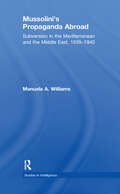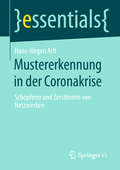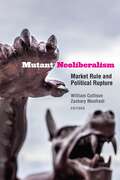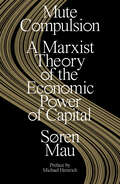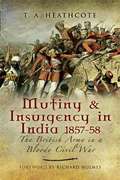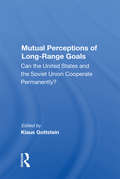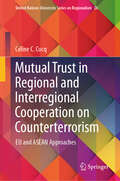- Table View
- List View
Mussolini's Italy
by R. J. BosworthWith Mussolini 's Italy, R.J.B. Bosworth--the foremost scholar on the subject writing in English--vividly brings to life the period in which Italians participated in one of the twentieth century's most notorious political experiments. Il Duce's Fascists were the original totalitarians, espousing a cult of violence and obedience that inspired many other dictatorships, Hitler's first among them. But as Bosworth reveals, many Italians resisted its ideology, finding ways, ingenious and varied, to keep Fascism from taking hold as deeply as it did in Germany. A sweeping chronicle of struggle in terrible times, this is the definitive account of Italy's darkest hour.
Mussolini's Nature: An Environmental History of Italian Fascism
by Marco Armiero Roberta Biasillo Wilko Graf von HardenbergThis exploration of the environmental practices of Benito Mussolini&’s fascist regime invites readers to consider the ecological connections of all political projects.&“We might think we see a mountain while it was a war; a forest can actually be an engine; a monument to workers might reflect the violence of a colonial empire.&”—extracted from Mussolini&’s Nature In this first environmental history of Italian fascism, Marco Armiero, Roberta Biasillo, and Wilko Graf von Hardenberg reveal that nature and fascist rhetoric are inextricable. Mussolini&’s Nature explores fascist political ecologies, or rather the practices and narratives through which the regime constructed imaginary and material ecologies functional to its political project. The book does not pursue the ghost of a green Mussolini by counting how many national parks were created during the regime or how many trees planted. Instead, the reader is trained to recognize fascist political ecology in Mussolini&’s speeches, reclaimed landscapes, policies of economic self-sufficiency, propaganda documentaries, reforested areas, and in the environmental transformation of its colonial holdings. The authors conclude with an examination of the role of fascist landscapes in the country&’s postwar reconstruction: Mussolini&’s nature is still visible today through plaques, monuments, toponomy, and the shapes of landscapes. This original, and surprisingly intimate, environmental history is not merely a chronicle of conservation in fascist Italy but also an invitation to consider the socioecological connections of all political projects.
Mussolini's Propaganda Abroad: Subversion in the Mediterranean and the Middle East, 1935-1940 (Studies in Intelligence)
by Manuela WilliamsThis is the first major study in English of Fascist Italy’s overseas propaganda. Using rare Italian and French captured documents, this is also the first investigation into the relationship between Mussolini’s regime and Arab nationalist movements This new account covers propaganda and subversive activities engineered by the Italian government in the Mediterranean and the Middle East from 1935 until 1940, when Italy entered the war. It assesses the nature of the challenge brought by the Fascist regime to British security and colonial interests in the region. Fascist propaganda, in particular in the Arab Middle East, must be regarded as an expression of Mussolini’s foreign policy and his attempts to build an Italian empire that would stretch beyond the Mediterranean, gaining control over the exits, Gibraltar and Suez, which were in the hands of the British and the French. The activities of individual agents and organizations are carefully reconstructed and analyzed to highlight the seemingly contradictory objectives of the Italian government: on the one hand, Rome was courting the Arab nationalist movements in Egypt and Palestine, which were seeking the support of external forces capable of providing political, financial and military backing needed to overthrow foreign rulers; on the other, the regime was promoting further territorial expansion in Africa. These aspects build into an excellent picture of this fascinating period of modern history. This book will be of great interest to all students and scholars of politics, media, Italian history and propaganda.
Must We Defend Nazis?: Why the First Amendment Should Not Protect Hate Speech and White Supremacy
by Richard Delgado Jean StefancicA controversial argument for reconsidering the limits of free speech Swirling in the midst of the resurgence of neo-Nazi demonstrations, hate speech, and acts of domestic terrorism are uncomfortable questions about the limits of free speech. The United States stands apart from many other countries in that citizens have the power to say virtually anything without legal repercussions. But, in the case of white supremacy, does the First Amendment demand that we defend Nazis? In Must We Defend Nazis?, legal experts Richard Delgado and Jean Stefancic argue that it should not. Updated to consider the white supremacy demonstrations and counter-protests in Charlottesville and debates about hate speech on campus and on the internet, the book offers a concise argument against total, unchecked freedom of speech. Delgado and Stefancic instead call for a system of free speech that takes into account the harms that hate speech can inflict upon disempowered, marginalized people. They examine the prevailing arguments against regulating speech, and show that they all have answers. They also show how limiting free speech would work in a legal framework and offer suggestions for activist lawyers and judges interested in approaching the hate speech controversy intelligently. As citizens are confronting free speech in contention with equal dignity, access, and respect, Must We Defend Nazis? puts aside clichés that clutter First Amendment thinking, and presents a nuanced position that recognizes the needs of our increasingly diverse society.
Mustafa Kemal Atatürk: Heir to the Empire (The World in a Life Series)
by Ryan Gingeras<p>Part of The World in a Life series, this brief text provides insight into the life of Mustafa Kemal Atatürk. By the outbreak of World War II, the Republic of Turkey epitomized more than a state bound for better times; it aspired to represent the essence of modern politics in the twentieth century. To contemporaries of this period, Mustafa Kemal Atatürk--the country's first president--was both the muse and the architect of this radical transformation. By the time of his death in 1938, he was regularly compared alongside other luminary statesmen of the post-Versailles era. Outside of Turkey, his name was synonymous with bold leadership and ambitious reform. Atatürk's reputation as a man both progressive and iconoclastic greatly augmented his already lofty status as Turkey's premier general and war hero. Yet there were some aspects of his life presidency that tempered contemporary admiration for Mustafa Kemal. His acclaim and celebrity came with the understanding that he was a dictator with little patience for liberal democracy. Atatürk's inability to brook compromise and tolerate opposition engendered acts of violence and oppression that resulted in the deaths of large numbers of his fellow citizens. As a whole, the legacies of both his achievements and flaws as a leader remain critical to any understanding of modern-day Turkey. <p>We live in a global age where big concepts like "globalization" often tempt us to forget the personal side of the past. The titles in The World in a Life series aim to revive these meaningful lives. Each one shows us what it was like to live on a world historical stage. Brief, inexpensive, and thematic, each book can be read in a week, fit within a wide range of curricula, and shed insight into a particular place or time. Four to six short primary sources at the end of each volume sharpen the reader's view of an individual's impact on world history.</p>
Mustererkennung in der Coronakrise: Schöpferin und Zerstörerin von Netzwerken (essentials)
by Hans-Jürgen ArltMitten im digitalen Fortschritt grätscht die Natur dazwischen. Von der Coronakrise lässt sich die Moderne nicht aufhalten auf ihrem Weg in die Computergesellschaft. Aber sie gerät unter verschärfte Beobachtung. Die Massenmedien legen den Sinnschleier der Krise über den öffentlichen Disput. Die Politik zeigt in der Funktion der Risikomanagerin, was sie (nicht) kann. Die Wirtschaft kämpft darum, den Status als Primus des Alltags zurückzugewinnen. Organisationen und Personen machen die klassische Krisenerfahrung, dass Schwache für Opferrollen prädestiniert sind. Spricht etwas dafür, dass die moderne Steigerungslogik von Nachhaltigkeit abgelöst, Konkurrenzdynamik von Kollaboration zivilisiert, Kommerzialisierung von Solidarität begrenzt wird? Das Essential entwickelt eine eigene Perspektive auf Phänomene und Potentiale.
Mutant Neoliberalism: Market Rule and Political Rupture
by William Callison and Zachary ManfrediTales of neoliberalism’s death are serially overstated. Following the financial crisis of 2008, neoliberalism was proclaimed a “zombie,” a disgraced ideology that staggered on like an undead monster. After the political ruptures of 2016, commentators were quick to announce “the end” of neoliberalism yet again, pointing to both the global rise of far-right forces and the reinvigoration of democratic socialist politics. But do new political forces sound neoliberalism’s death knell or will they instead catalyze new mutations in its dynamic development?Mutant Neoliberalism brings together leading scholars of neoliberalism—political theorists, historians, philosophers, anthropologists and sociologists—to rethink transformations in market rule and their relation to ongoing political ruptures. The chapters show how years of neoliberal governance, policy, and depoliticization created the conditions for thriving reactionary forces, while also reflecting on whether recent trends will challenge, reconfigure, or extend neoliberalism’s reach. The contributors reconsider neoliberalism’s relationship with its assumed adversaries and map mutations in financialized capitalism and governance across time and space—from Europe and the United States to China and India. Taken together, the volume recasts the stakes of contemporary debate and reorients critique and resistance within a rapidly changing landscape.Contributors: Étienne Balibar, Sören Brandes, Wendy Brown, Melinda Cooper, Julia Elyachar, Michel Feher, Megan Moodie, Christopher Newfield, Dieter Plehwe, Lisa Rofel, Leslie Salzinger, Quinn Slobodian
Mute Compulsion: A Marxist Theory of the Economic Power of Capital
by Søren MauA new Marxist theory of the abstract and impersonal forms of power in capitalismDespite insoluble contradictions, intense volatility and fierce resistance, the crisis-ridden capitalism of the 21st century lingers on. To understand capital&’s paradoxical expansion and entrenchment amidst crisis and unrest, Mute Compulsion offers a novel theory of the historically unique forms of abstract and impersonal power set in motion by the subjection of social life to the profit imperative. Building on a critical reconstruction of Karl Marx&’s unfinished critique of political economy and a wide range of contemporary Marxist theory, philosopher Søren Mau sets out to explain how the logic of capital tightens its stranglehold on the life of society by constantly remoulding the material conditions of social reproduction. In the course of doing so, Mau intervenes in classical and contemporary debates about the value form, crisis theory, biopolitics, social reproduction, humanism, logistics, agriculture, metabolism, the body, competition, technology and relative surplus populations.
Mute Speech: Literature, Critical Theory, and Politics (New Directions in Critical Theory)
by Jacques RancièreJacques Rancière has continually unsettled political discourse, particularly through his questioning of aesthetic "distributions of the sensible," which configure the limits of what can be seen and said. Widely recognized as a seminal work in Rancière's corpus, the translation of which is long overdue, Mute Speech is an intellectual tour de force proposing a new framework for thinking about the history of art and literature. Rancière argues that our current notion of "literature" is a relatively recent creation, having first appeared in the wake of the French Revolution and with the rise of Romanticism. In its rejection of the system of representational hierarchies that had constituted belles-letters, "literature" is founded upon a radical equivalence in which all things are possible expressions of the life of a people. With an analysis reaching back to Plato, Aristotle, the German Romantics, Vico, and Cervantes and concluding with brilliant readings of Flaubert, Mallarmé, and Proust, Rancière demonstrates the uncontrollable democratic impulse lying at the heart of literature's still-vital capacity for reinvention.
Muting Israeli Democracy: How Media and Cultural Policy Undermine Free Expression
by Amit M. SchejterThe result of years of critical analysis of Israeli media law, this book argues that the laws governing Israeli electronic media are structured to limit the boundaries of public discourse. Amit M. Schejter posits the theory of a "mute democracy," one in which the media are designed to provide a platform for some voices to be heard over others. While Israel's institutions may be democratic, and while the effect of these policies may be limited, this book contends that free speech in Israel is institutionally muted to ensure the continued domination of the Jewish majority and its preferred interpretation of what Israel means as a Jewish-democratic state. Analyzing a wide range of legal documents recorded in Israel from 1961 to 2007, Muting Israeli Democracy demonstrates in scrupulous detail how law and policy are used to promote the hegemonic national culture through the constraints and obligations set on electronic media.
Mutiny & Insurgency in India, 1857–58: The British Army in a Bloody Civil War
by T. A. HeathcoteA vivid account of the bloody rebellion against colonial rule that raged through Northern India in the mid-nineteenth century. In 1857, a mutiny against the British East India Company broke out in the Bengal Army that would soon spread to Delhi and beyond. The cycle of bloody reprisals would continue for a little over two years, leaving countless bodies in its wake. The events of 1857 to 1859 were tragic and momentous. The challenge to British colonial rule was on an unprecedented scale. This book places these grim events into their historical, political, and economic contexts, and the authors&’ use of sources including personal accounts brings events of over a century and a half ago vividly to life.
Mutiny & Insurgency in India, 1857–58: The British Army in a Bloody Civil War
by T. A. HeathcoteA vivid account of the bloody rebellion against colonial rule that raged through Northern India in the mid-nineteenth century. In 1857, a mutiny against the British East India Company broke out in the Bengal Army that would soon spread to Delhi and beyond. The cycle of bloody reprisals would continue for a little over two years, leaving countless bodies in its wake. The events of 1857 to 1859 were tragic and momentous. The challenge to British colonial rule was on an unprecedented scale. This book places these grim events into their historical, political, and economic contexts, and the authors&’ use of sources including personal accounts brings events of over a century and a half ago vividly to life.
Mutual Accompaniment as Faith-Filled Living: Recognition of the Vulnerable Other
by Gerard J. RyanIn this book, Gerard J. Ryan examines the interrelationship between recognition theory and theology with their respective concerns for what it means to be a human. He advocates a mutual accompaniment that reformulates recognition theory within a practical and public theology. Ryan develops this interpersonal recognition through the accompaniment of vulnerable people, particularly persons with disabilities and those who suffer from mental illness. He explores three contexts that support this mutual accompaniment and the labour of recognition. These are narrativity, the stories we live out of; vulnerability, the basic human condition common to all; and participation, the inter-relationship of humanity.
Mutual Aid: A Factor of Evolution
by Peter KropotkinIn this cornerstone of modern liberal social theory, Peter Kropotkin states that the most effective human and animal communities are essentially cooperative, rather than competitive. Kropotkin based this classic on his observations of natural phenomena and history, forming a work of stunning and well-reasoned scholarship. Essential to the understanding of human evolution as well as social organization, it offers a powerful counterpoint to the tenets of Social Darwinism. It also cites persuasive evidence of human nature's innate compatibility with anarchist society."Kropotkin's basic argument is correct," noted evolutionary biologist Stephen Jay Gould. "Struggle does occur in many modes, and some lead to cooperation among members of a species as the best pathway to advantage for individuals." Anthropologist Ashley Montagu declared that "Mutual Aid will never be any more out of date than will the Declaration of Independence. New facts may increasingly become available, but we can already see that they will serve largely to support Kropotkin's conclusion that 'in the ethical progress of man, mutual support—not mutual struggle—has had the leading part.'" Physician and author Alex Comfort asserted that "Kropotkin profoundly influenced human biology by his theory of Mutual Aid. . . . He was one of the first systematic students of animal communities, and may be regarded as the founder of modern social ecology."
Mutual Aid: A Factor of Evolution
by Peter KropotkinA pioneering treatise on cooperation and reciprocity, from the great anarchist thinker'Don't compete! - competition is always injurious to the species, and you have plenty of resources to avoid it!'In his pioneering 1902 treatise on human cooperation, the anarchist thinker and natural scientist Peter Kropotkin argued that it is our innate instinct for mutual aid - rather than mutual struggle - which enables societies to survive and flourish. From the earliest days of evolution through to medieval guilds, indigenous nomads and modern voluntary organisations, Kropotkin's vision of small-scale, ecologically sustainable, collective communities challenged the orthodoxies of his age, whether individualism or Marxism. Mutual Aid offers instead a radical, and prescient, rewriting of the whole of human history.With an introduction by David Priestland
Mutual Aid: Building Solidarity During This Crisis (and the Next)
by Dean SpadeMutual aid is the radical act of caring for each other while working to change the world. Around the globe, people are faced with a spiralling succession of crises, from the Covid-19 pandemic and climate change-induced fires, floods, and storms to the ongoing horrors of mass incarceration, racist policing, brutal immigration enforcement, endemic gender violence, and severe wealth inequality. As governments fail to respond to—or actively engineer—each crisis, ordinary people are finding bold and innovative ways to share resources and support the vulnerable. Survival work, when done alongside social movement demands for transformative change, is called mutual aid.This book is about mutual aid: why it is so important, what it looks like, and how to do it. It provides a grassroots theory of mutual aid, describes how mutual aid is a crucial part of powerful movements for social justice, and offers concrete tools for organizing, such as how to work in groups, how to foster a collective decision-making process, how to prevent and address conflict, and how to deal with burnout. Writing for those new to activism as well as those who have been in social movements for a long time, Dean Spade draws on years of organizing to offer a radical vision of community mobilization, social transformation, compassionate activism, and solidarity.
Mutual Aid: The Other Law of the Jungle
by Pablo Servigne Gauthier ChapelleIn the merciless arena of life, we are all subject to the law of the jungle, to ruthless competition and the survival of the fittest – such is the myth that has given rise to a society that has become toxic for our planet and for our and future generations. But today the lines are shifting. A growing number of new movements and thinkers are challenging this skewed view of the world and reviving words such as ‘altruism’, ‘cooperation’, ‘kindness’ and ‘solidarity’. A close look at the wide spectrum of living beings reveals that, at all times and in all places, animals, plants, microorganisms and human beings have practised different forms of mutual aid. And those which survive difficult conditions best are not necessarily the strongest, but those which help each other the most. Pablo Servigne and Gauthier Chapelle explore a vast, forgotten continent of mutual aid in order to discover the mechanisms of this ‘other law of the jungle’. In so doing, they provide a more rounded view of the world of living things and give us some of the conceptual tools we need to move beyond the vicious circle of competition and self-destruction that is leading our civilization to the verge of collapse.
Mutual Perceptions Of Long-range Goals: Can The United States And The Soviet Union Cooperate Permanently?
by Klaus GottsteinThis book investigates perceptions—including strategic, normative and imagined perceptions—of long-range political goals both in the East and in the West, discussing the arguments which are used to support each of these perceptions.
Mutual Security in the Asia-Pacific: Roles for Australia, Canada and South Korea
by Kang Choi James Manicom Simon PalamarMyriad challenges to regional stability and security threaten East Asia's burgeoning growth and prosperity. Mutual Security in the Asia-Pacific: Roles for Australia, Canada and South Korea addresses the economic and security challenges that loom in the region and the role that these three countries can play to ensure a stable, predictable political environment.
Mutual Security in the Asia-Pacific: Roles for Australia, Canada and South Korea
Myriad challenges to regional stability and security threaten East Asia’s burgeoning growth and prosperity. Mutual Security in the Asia-Pacific: Roles for Australia, Canada and South Korea addresses the economic and security challenges that loom in the region and the role that these three countries can play to ensure a stable, predictable political environment.
Mutual Trust in Regional and Interregional Cooperation on Counterterrorism: EU and ASEAN Approaches (United Nations University Series on Regionalism #26)
by Céline C. CocqThis book provides a detailed theoretical and practical analysis of a key concept in cooperation, namely mutual trust, in the EU and ASEAN regions. It particularly looks at the issue of counterterrorism. It analyses the differences in the legalistic approach of the EU and the consultation and consensus-based approach in the ASEAN region, and the correlation between mutual trust and regional and interregional cooperation against terrorism. Thereby, this book extends the well-known concept of counterterrorism in EU criminal law to another regional case in order to analyse its possible use and operationalisation in other regions. It provides important findings on whether and, if so, how the EU and ASEAN legal frameworks have facilitated intra-regional – and potentially interregional – cooperation. In order to measure trust, it focuses on information sharing, and discusses the terminology related to this matter, the mechanisms of cooperation, and the difficulties and successes of information sharing. This book is of great interest for academics doing research on trust, transnational cooperation, regional counterterrorism legal architecture in the EU and ASEAN, and comparative legal regional and interregional analysis, and officials and practitioners involved in transnational cooperation in criminal matters, especially terrorism.
Muzzled: From T-Ball to Terrorism--True Stories That Should Be Fiction
by Michael SmerconishSick of the total BS of rampant PC? This brazen, furiously funny book is the antidote to today's poison of political correctness. With humor and chutzpah, attorney, commentator, and popular radio host Michael Smerconish takes on today's oversensitive culture with a collection of entertaining, outlandish anecdotes about PC gone wild-stories that are hilarious, horrifying, and unbelievably true. Why are sports leagues handing out trophies to losers? Why are little old grandmas hired to guard 200-pound prisoners? Why are newborn babies and old men with walkers singled out at the airport while likely terrorists are ushered through security with ease? This book shows through these absurdities that today's atmosphere of censorship and multiculturalism is paving the way for serious threats to our cultural identity and national security: "It's one thing for the forces of political correctness to muzzle our day-to-day lives here at home in the US, quite another when that same cancer metastasizes into the war on terror." We must eradicate the PC disease. Our sanity-and our very lives-depend on it. "Michael Smerconish talks the talk: If you say unpopular things, watch out! Using vivid examples of PC rubbish, Muzzled will lead you into a world that would terrify Rod Serling. An entertaining and provocative book." -Bill O'Reilly "Reads like fiction, too bad it's true." -Nelson DeMille, novelist, author of Night Fall and The General's Daughter "The PC virus is out of control . . . and it's worse than you think! In this entertaining and important book, Michael Smerconish chronicles just how mindless things have gotten in politically correct America. He tells fascinating stories that will make you laugh . . . right up until the time they make you scream. Thanks to the PC crowd, we are all living in The United States of the Absurd." -Bernard Goldberg, journalist and author of 100 People Who Are Screwing Up America, Arrogance, and Bias "I really squirm whenever I find myself agreeing with Smerconish. (I know the feeling is mutual.) I did a lot of squirming while reading this provocative book. All true liberals and conservatives must agree with Smerconish that the PC muzzles must be removed so that people can decide based on the marketplace of ideas." -Alan Dershowitz, Felix Frankfurter Professor of Law, Harvard and author of Preemption "I don't often find myself on the same side of the political barricades as Michael Smerconish. But Muzzled is a witty, provocative, and timely book. Even when Michael is wrong, which is often, he draws you in and keeps you reading." -Arianna Huffington, author of Pigs at the Trough and Fanatics and Fools "In Muzzled, my American Blood Brother of status-quo-obliterating defiance, Michael Smerconish, once again smokes out the cockroaches of political correctness . . . Muzzled is a great title for a book that I am convinced every American school kid should read and be tested on. If a new generation doesn't grow some intellectual balls, our Once Great Nation will continue to repeat horrific mistakes and pay the price . . . Read it. Live it." -Ted Nugent, rock star, author, television personality, and hunter extraordinaire
My (Our) President Has Balls!: An Examination of the Cultural Divide in America Today
by Frank MascettiMy (Our) President Has Balls takes a deep look at the cultural divide in America today, breaking down that divide into nearly twenty categories and encouraging readers to do their part to fix what’s been broken. While there have been countless books released by politicians, past presidents, news personnel, and Washington insiders, Frank Mascetti addresses America’s cultural divide as an extremely passionate “outsider” who is raising two minors. Expressing concern about where America is headed as a nation and what is being left behind for future generations, Mascetti breaks down America’s great divide into specific categories with which readers immediately can identify. These categories include things like The Trump Complex, What American Doesn’t Want These Things, Political Incorrectness, Inside the Mind of a Hater, and so many more. Rather than placing blame on past administrations, Mascetti takes a hard look at America’s overall culture today—from schools to teachers to social media—and how many aspects are in desperate need of a makeover. Whether readers are Democrats, Republican, or Independent, My (Our) President Has Balls is sure to enlighten and provide fresh perspective on the State of the Union, encouraging all Americans to start thinking about how political opposites can meet in the middle and begin to pull America out of crisis mode.
My African Journey (Winston S. Churchill Early Works)
by Winston S. ChurchillThe future Prime Minister recounts his excursions through colonial East Africa in this 1908 travelogue complete with maps and photographs. In the early years of the 20th Century, Winston Churchill served as Undersecretary of State for the British Colonies. During this time, he lobbied for permission to tour and inspect Britain's holdings in East Africa. In My African Journey, Churchill provides a detailed chronicle of his trip, documenting his experiences, the people he met, and his thoughts on how Britain might best wield its power in the region. Detailing his experiences on the Uganda Railway, around Mount Kenya, and beyond, Churchill&’s journal is a fascinating travel narrative. It is also a significant historical document, providing a firsthand account of Churchill&’s views on colonialism in the early 20th century.
My America
by Hugh Downs"Some of these essays are powerful and poetic. Some seem to reflect a stunned condition on the part of the contributor. But all of them share a newborn or reawakened feeling about the country we live in -- an underlying concern for it, whether that concern is rooted in anger and fear, or in a sensed and urgent need for action, or internal correction, or wagon-circling. Some are personal narratives that explain and justify the patriotism of the writer. Some examine and praise the values that make the country great." -- Hugh Downs, from the Introduction What is the essence of America? In this fascinating new collection inspired by one of our most trusted and beloved commentators, 150 diverse Americans -- from top politicians and entertainers to firefighters and teachers -- express in their own words what America means to them. My America includes candid insights from television journalists such as Mike Wallace and Barbara Walters; politicians including former president George Bush and John Glenn; writers such as Walter Anderson and Anita Diamant; and entertainers, among them Dave Brubeck and Patricia Neal; as well as lesser-known citizens from all over the country. These frank and thought-provoking observations from Americans of every age, race, religion, and social position compellingly illustrate the American mosaic and offer a glimpse into the subconscious mind of this unique and wonderful nation. This touching volume, celebrating the similarities and the differences of a people, reflects our core values and is sure to inspire pride in America. Edited and with an introduction and an epilogue by Hugh Downs -- who coanchored ABC's 20/20, hosted NBC's Today show, and has been an important American voice for more than half a century -- My America explores the values, ideals, and dreams that all Americans share. At a time when people are reassessing their patriotism and rediscovering their national allegiance, emotions regarding the United States are stronger and more poignant than they have been in years, and this sentiment has been captured in these pages. My America is a timely collection for anyone who wants to reflect on America's past, or celebrate its future.


